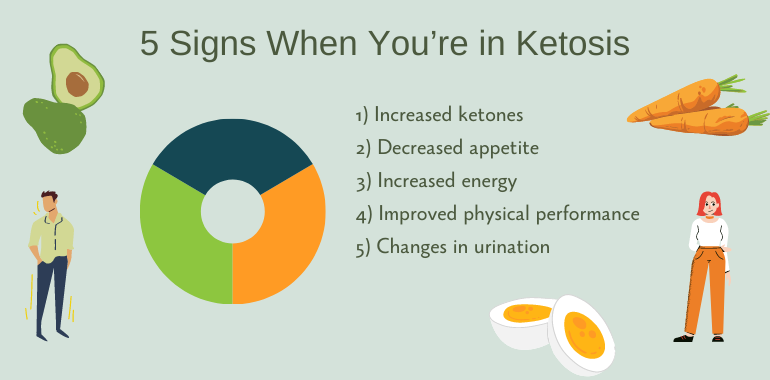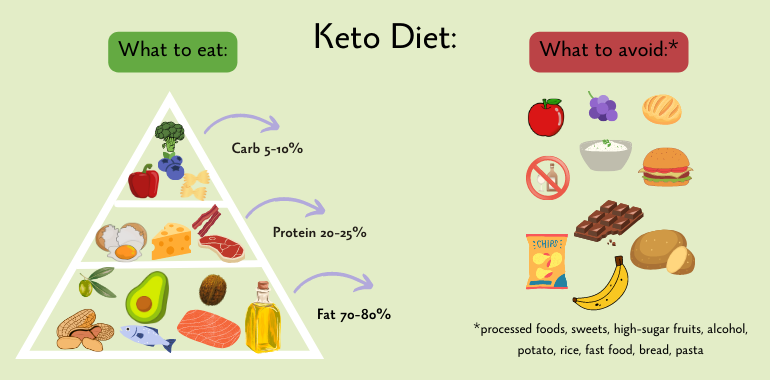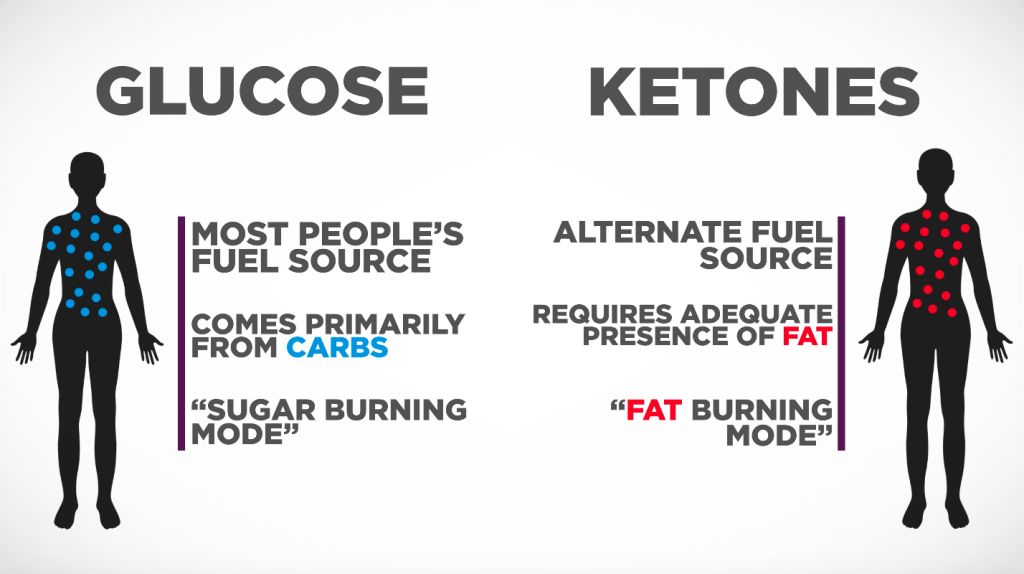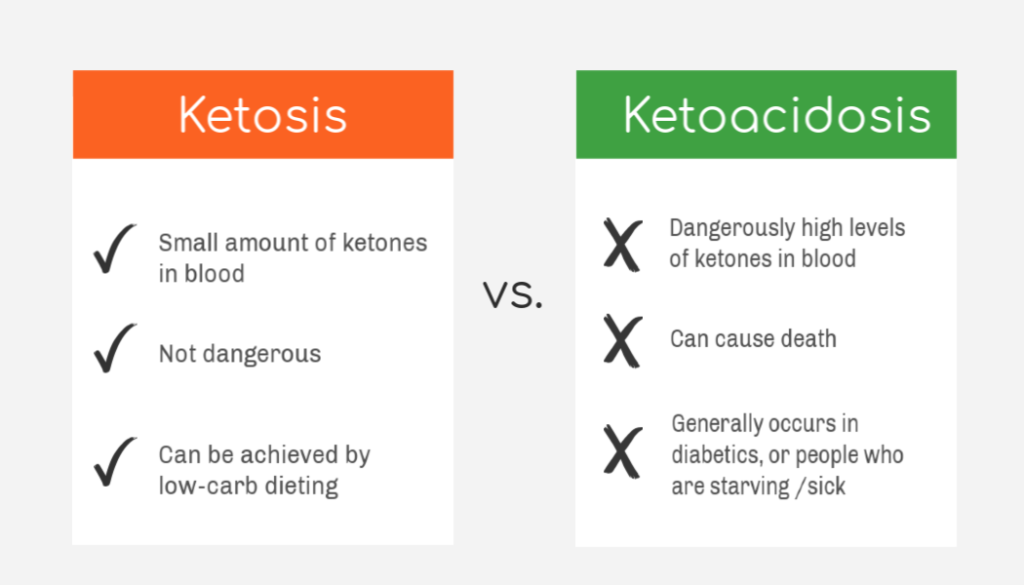Table Of Contents
Ketosis is a metabolic state where your body burns fat for energy instead of carbohydrates. This natural process happens when carb intake is limited, causing the liver to produce ketones that fuel your brain and body. Whether you’re exploring the keto diet for weight loss or health benefits, understanding what happens during ketosis is essential for success. This guide covers everything from recognizing ketosis signs to maximizing its benefits for your health journey.
Key Takeaways:
- Ketosis occurs when your body shifts from burning glucose to burning fat for energy
- The process typically takes 2-7 days to begin, depending on individual factors
- Common ketosis symptoms include initial weight loss, reduced appetite, and increased energy
- Monitoring ketone levels in blood, breath, or urine can confirm if you’ve reached ketosis
- A proper ketogenic diet focuses on healthy fats, moderate protein, and minimal carbs
What Is Ketosis and How Does It Work?
Ketosis is a metabolic state in which the body burns fat instead of glucose (carbohydrates) for energy. This happens when the body reaches a deficit in carbohydrates (from dieting or other deficiency), and in the process, ketones are created. These ketones, produced by chemicals in the liver, are sent through the bloodstream for muscles and other tissues to use as fuel.
In short, ketosis occurs when your body doesn’t have enough carbs available, so it taps into stored fats for energy instead. This process is standard in people with diabetes, as it can occur if the body is insulin-deficient or cannot correctly utilize insulin.
Signs of Ketosis: Your Body’s Transition to Fat-Burning
When your body enters ketosis, it exhibits several telltale signs and symptoms. These ketosis signs can vary in intensity from person to person but typically include weight loss (especially in the first week), reduced appetite, and changes in energy levels. Initially, the weight loss comes from depleted carb stores and water, but soon shifts to actual fat loss.
Other common ketosis symptoms include:
- “Keto Flu” – temporary symptoms like fatigue, irritability, nausea, difficulty sleeping, and constipation
- “Keto Breath” – a distinctive fruity or sour smell due to the presence of acetone (a type of ketone)
- Increased urination and thirst as your body flushes out excess ketones
- Mental clarity and improved focus once the initial adjustment period passes
How Ketosis Works in Your Body
When you drastically reduce carbohydrate intake, your body goes through several metabolic changes. First, it uses up stored glycogen (carbohydrates stored in your liver and muscles). Once these reserves are depleted – usually within 24-48 hours – your body needs an alternative energy source.
Your liver then begins converting fatty acids into ketone bodies: acetoacetate, beta-hydroxybutyrate, and acetone. These ketones circulate through your bloodstream, providing energy to your brain, muscles, and other tissues. This shift represents a fundamental change in how your body produces and uses energy.
The brain, which typically relies heavily on glucose, adapts to using ketones for up to 70% of its energy needs. This metabolic flexibility allows your body to function efficiently even with minimal carbohydrate intake, which is why many people report improved mental clarity once they’ve fully adapted to ketosis.
The Three Stages of Ketosis
Ketosis unfolds in three distinct stages as your body adapts to this new metabolic state:
- Getting into ketosis
One way of initiating deep ketosis includes fasting. Fasting helps start ketosis (typically in three days), in which the body begins to burn the remaining glucose and begins the process of carb reduction. Intermittent fasting is recommended to ease into ketogenic food while fasting burns the remaining glucose. This is because intake is restricted to a cycle (usually an 8-hour window of food intake and a 16-hour window of fasting).
- Keto-adaption
In this stage, it is essential to maintain daily activities including exercise to help the body build up to the fat-burning mode. During keto-adaptation, your cells increase their ability to use ketones efficiently while reducing their dependence on glucose. This adaptation phase typically takes 2-4 weeks, during which your exercise performance may temporarily decrease before improving.
- Metabolic flexibility
This stage focuses on maintaining ketosis through a fast-forward keto diet, exercise, and reduced carb intake. Once you’ve reached metabolic flexibility, this consistency can limit the body’s responses when encountering small amounts of foods/nutrients outside the keto diet, thus maintaining the ketogenic process. At this point, your body can easily switch between burning fat and carbohydrates depending on what’s available.
How Long Does It Take to Enter Ketosis?
Getting into a state of ketosis is a process that everyone’s body adapts to differently. While some people might keto-adapted in as little as 2 or 3 days, others can take up to a week or more.
Generally, it depends on many factors, including an individual’s diet and macronutrient ratios, activity level, and other factors such as age and genetics. However, despite being different for each person, reaching ketosis typically decreases over time as your body gradually adjusts to the new fuel source.
When you significantly limit your carbohydrate intake, your body’s glycogen stores become depleted, and it starts to break down stored fat for energy. As your body switches to using fat for fuel, it produces ketones that fuel your brain and other organs.
If you are just starting your ketogenic journey, remember that achieving what is deep ketosis may take longer than expected – but it’s possible with perseverance!

5 Key Signs You’re in Ketosis
- Increased ketones in blood, urine, or breath: One of the most reliable ways to confirm ketosis is to measure the levels of ketones in your blood, urine, or breath. Increased levels of ketones are a sign that your body is using fat for fuel instead of carbohydrates.
- Decreased appetite: Many people experience a decreased appetite when they enter ketosis, as ketones can help suppress hunger hormones. This natural appetite suppression makes it easier to maintain a calorie deficit without feeling constantly hungry.
- Increased energy and mental clarity: Once your body has adapted to using ketones for fuel, many people report increased energy levels and improved mental focus. This often happens after the initial “keto flu” phase has passed.
- Improved physical performance: Some people report improved physical performance and endurance in ketosis, particularly during long-duration activities. Your muscles become more efficient at using fat for fuel during extended exercise.
- Changes in urination and thirst: When your body is in ketosis, you may experience more frequent urination and increased thirst as your body tries to flush out excess ketones. Staying properly hydrated becomes especially important during this time.
Physical Changes to Expect When Starting Keto
When you start a ketogenic diet, you may notice some changes in your appearance within the first few weeks. Here are a few things you can expect:
- Weight loss
One of the most noticeable changes in appearance that people experience when starting a ketogenic diet is weight loss. The diet’s low-carbohydrate, high-fat nature can help reduce overall calorie intake and promote fat burning. Many people experience a rapid initial weight loss due to water weight, followed by a more steady fat loss.
- Decreased bloating
Many people experience reduced bloating when starting a ketogenic diet. This is because the diet is low in carbohydrates, which can cause water retention and bloating. Your abdominal area often appears flatter and less distended within the first week of starting keto.
- Clearer skin
Some people report clearer skin when following a ketogenic diet. The diet is typically low in processed foods and added sugars that can contribute to acne and other skin issues. The anti-inflammatory effects of ketosis may also help reduce skin problems for many individuals.
Foods That Trigger Ketosis
Ketosis is a metabolic state in which your body utilizes fat as fuel instead of carbohydrates. It has proven beneficial health effects and can affect weight loss efforts if youʼre on the right nutrition plan. However, to get into ketosis, you must pay close attention to the foods you consume.
A typical keto diet is based on high-fat, moderate protein, and low-carbohydrate intake.
Foods such as eggs, avocados, fatty fish like salmon, nuts, and nut kinds of butter, olive oil, cheese, and butter are excellent for putting your body into ketosis. If you’re short on time, other convenient options, such as ketogenic meal replacement shakes, can help get you into the desired metabolic state.
By consuming the proper macro-nutrient ratios of fats, proteins, and carbs daily, your body will start burning fat as fuel instead of glucose from carbohydrates. The ideal macronutrient breakdown typically involves 70-80% of calories from fat, 15-20% from protein, and just 5-10% from carbohydrates.

The Keto Diet Explained
The keto diet is comprised of a low-carb, high-fat, and moderate protein food intake. This dietary approach forces your body to enter ketosis by drastically reducing carbohydrate consumption and replacing it with fat. When you follow this eating pattern, your body becomes incredibly efficient at burning fat for energy instead of carbohydrates.
While many diets focus on restricting calories or fat intake, the ketogenic diet takes a different approach by restricting carbohydrates. This shifts your metabolism into a state that mimics fasting without actually depriving your body of calories. The result is a metabolic state called ketosis, where your liver produces ketones that serve as an alternative fuel source for your brain and body.
Foods to Eat on a Ketogenic Diet
When following a ketogenic diet, these foods should form the foundation of your eating plan:
- Low-carb veggies like leafy greens, broccoli, cauliflower, zucchini, and bell peppers
- Cheese varieties including cheddar, cream cheese, blue cheese, goat cheese, and mozzarella
- Healthy fats such as avocados, nuts, seeds, and oils low in net carbs, such as olive oil and coconut oil
- Sources of protein such as poultry and eggs and other lean meats, preferably grass-fed or organic
- Plain Greek yogurt and cottage cheese (in moderation, as they contain some carbs)
- Berries like strawberries, blackberries, and raspberries (in limited quantities)
- Dark chocolate and cocoa powder (70% cocoa content or higher)
As far as beverages, water, unsweetened coffee, and tea are recommended to aid in hydration and maintain energy during ketone metabolism. Whole or plant-based milk is also recommended for protein and calcium intake, though you should check the carb content carefully before consuming plant-based alternatives.
Foods to Avoid on Keto
It’s essential to be aware of foods outside of a ketogenic diet that can halt the process of ketosis. These foods are high in carbs, thus negating the process of ketosis.
Foods that should be avoided include:
- Processed foods, such as sweetened yogurt, chips, and crackers
- Honey, syrup, and sugar in any form
- Juices (natural or not) that are higher in carbs
- Grains such as cereal, crackers, rice, pasta, bread, and beer that are high in carbohydrates
It’s worth noting that even whole-wheat/bean-based pasta still holds high carb levels, although they’re often marketed as healthier alternatives. These can quickly derail your ketosis if consumed in normal portions.
Although beneficial to an extent, these are some of the foods that should be greatly limited during a ketogenic diet:
- Starchy vegetables, such as corn, potatoes, sweet potatoes, and beets –
These types of vegetables are higher in carbs and if not maintained, these starchy foods may alter ketosis.
- High-sugar fruits, such as bananas, raisins, dates, pears, and mangos –
These fruits may spike blood sugar and are also high in carbs.
3 Key Steps to Quickly Enter Ketosis
Entering ketosis can take time and varies from person to person, but you can take a few steps to help your body transition into ketosis more quickly. Here are three key steps:
1. Restrict carbohydrate intake
Restricting your carbohydrate intake is an essential step to getting into ketosis quickly. To enter ketosis, most people must limit their carbohydrate intake to fewer than 50 grams daily. However, some people may need to restrict their carbohydrate intake to as little as 20 grams daily to achieve ketosis. This dramatic reduction forces your body to seek alternative fuel sources.
2. Increase healthy fat consumption
Once you have restricted your carbohydrate intake, increasing your intake of healthy fats is essential. This will provide your body with the necessary fuel to transition to using fat for energy. Good sources of healthy fats include nuts, seeds, avocados, olive oil, and fatty fish. Making fats account for 70-80% of your calories supports efficient ketone production.
3. Incorporate moderate protein intake
While protein is an essential nutrient, too much protein can hinder ketosis. Therefore, it’s important to incorporate moderate protein intake into your diet. You should aim for 0.6-1 gram of protein per pound of lean body mass daily. This will help prevent muscle loss while allowing your body to enter ketosis. Excessive protein can be converted to glucose through gluconeogenesis, slowing ketosis.
Who Should Avoid the Keto Diet
The keto diet is not for everyone. Because it is highly restrictive by nature and can alter body chemistry, here are populations who should not indulge in the keto diet or attempt ketosis:
- Nursing or pregnant women
- People with type 1 diabetes
- People with pre-existing metabolic conditions
- People with pre-existing liver, pancreatic, or kidney damage
Additionally, individuals with a history of eating disorders should approach keto with caution, as the restrictive nature of the diet may trigger unhealthy relationships with food. Always consult with a healthcare provider before starting any significant dietary change, especially if you have pre-existing health conditions.
Understanding Keto Starvation Mode
Keto starvation mode is a term used to describe a situation in which the body’s metabolism slows down during a ketogenic diet due to a lack of sufficient calories or nutrients. When the body is deprived of carbohydrates, its primary energy source, it begins to burn stored fat for fuel. This process is known as ketosis.
- It may happen if you eat less
To enter and maintain ketosis, you must consume very few carbohydrates and moderate amounts of protein. However, you must also ensure you eat enough calories to support your body’s essential metabolic functions. If your calorie intake drops too low for too long, your body may enter a survival mode where metabolism slows to conserve energy.
- It can be prevented
You can avoid keto starvation by eating enough calories and nutrients to support your body’s essential metabolic functions. While restricting carbs is necessary for ketosis, severely restricting your overall calorie intake isn’t required and can be counterproductive. Focus on consuming adequate amounts of nutrient-dense, high-fat foods to meet your energy needs.
Ketones vs. Glucose as Brain Fuel
The brain can use ketones and glucose for fuel, but they have different metabolic pathways and may be preferable in other circumstances.
Glucose is the primary source of energy for the brain under normal conditions. Glucose is readily available from the carbohydrates in our diet and is transported across the blood-brain barrier by glucose transporters. The brain uses glucose to produce ATP, which is the primary energy currency of the cell.
On the other hand, during low carbohydrate intake or fasting periods, the liver produces ketones from fatty acids. The brain can also use ketones for energy, and they may even be a preferred fuel source for certain brain functions, such as cognitive processing and memory formation. Many ketogenic dieters report improved mental clarity and focus once their brains adapt to using ketones as fuel.
Some research suggests that ketones may provide more efficient energy for the brain compared to glucose, producing less oxidative stress. This potential neuroprotective effect has led to interest in ketogenic diets for various neurological conditions and disorders.
Benefits of Ketosis for Health and Weight Loss
The benefit of ketones is space for reducing cholesterol, which can improve cardiovascular health, metabolic disease, and the risk of diabetes.
Additional benefits include:
- Weight loss – Which can occur on behalf of ketones. The ketogenic diet promotes weight loss through multiple mechanisms, including reduced appetite, improved fat oxidation, and lower insulin levels.
- Increased energy – Ketones can improve the body’s mobility by aiding in muscle development and cell regeneration. Many people report more stable energy levels throughout the day without the crashes associated with carbohydrate metabolism.
- Increased focus – This can result on behalf of increased protein, which may influence brain development. Many people report improved cognitive function and mental clarity when in ketosis.
Other potential benefits being studied include improved blood sugar control, reduced inflammation, and possible therapeutic effects for certain neurological conditions. The anti-inflammatory properties of ketosis may contribute to many of these health benefits.

The Keto Advantage For Fat Loss
The Keto diet offers several advantages when it comes to fat loss. First, by promoting increased production of ketones and using fatty acids as the primary energy source, the Keto diet forces the body to use stored fat for fuel instead of carbohydrates. This can lead to rapid fat loss.
Additionally, when following a Ketogenic diet, appetite is often suppressed, helping individuals who struggle with overeating by curbing hunger pangs. On top of that, research suggests that being on the Keto diet helps preserve muscle mass while reducing body fat stores, which is essential for keeping metabolism at healthy levels long-term.
The ketogenic diet also helps maintain lower insulin levels, which facilitates fat burning. When insulin levels are high, your body is in fat-storage mode; when they’re lower, as happens in ketosis, your body more readily accesses fat stores for energy. This metabolic advantage makes keto particularly effective for losing stubborn fat deposits that have been resistant to other diet approaches.
Common Symptoms of Ketosis
Ketosis symptoms can vary from person to person, but several common signs indicate your body has entered this fat-burning state:
- Initial Weight Loss: Weight loss is a common symptom of ketosis as weight loss can occur in the first week. Initially, weight loss constitutes stored carbs and water in the body. Many people experience a rapid drop of 5-10 pounds in the first week.
- Reduced Appetite: A decreased hunger sensation is among the most noticeable ketosis symptoms. This occurs due to the satiating effect of fats and proteins, as well as the impact of ketones on hunger hormones.
- Keto Flu: This describes the body’s changes during the onset of ketosis including fatigue, irritability, nausea, difficulty sleeping, and constipation. These symptoms typically last a few days to a week as your body adapts.
- Keto Breath: This is described as a fruity or metallic smell that can occur due to acetone (a ketone body) being expelled through the breath. While temporarily unpleasant, it’s actually a good sign of ketosis.
After the initial adaptation period, many people report improved energy levels, better mental clarity, and steady weight loss as their bodies become fully keto-adapted. These positive symptoms of ketosis typically continue as long as you maintain the diet.
Monitoring Your Fat-Burning Rate During Ketosis
Monitoring your body’s natural fat-burning rate is one of the most efficient ways to measure weight loss. When your body enters a state of ketosis, it shifts its primary fuel source away from carbohydrates to fat and other ketones.
By understanding the link between a higher fat-burning rate and decreased caloric intake, you can be sure your dieting efforts will pay off. Studies have shown that those who monitor their bodies entering into ketosis are more likely to reach their weight loss goals than those who don’t.
Several methods can help you track your ketosis status:
- Blood ketone meters – The most accurate method, measuring beta-hydroxybutyrate (BHB) in your blood
- Breath analyzers – Measure acetone levels in your breath
- Urine strips – The most affordable option, though less accurate as your body becomes more efficient at using ketones
- Body measurements and weight tracking – Regular monitoring of your physical changes can help confirm fat loss
Ketoacidosis: When Ketosis Becomes Dangerous
When ketone levels get too high, ketoacidosis can occur. Ketoacidosis is a dangerous condition that can happen, typically in individuals with diabetes, and can be triggered due to illnesses that cause higher levels of hormones that work against insulin. Because the keto diet increases these ketones, monitoring symptoms and the level of ketones in the blood and urine is essential. Ketoacidosis tests can help detect ketone levels and can be done in medical settings and at home.
It’s important to understand the difference between nutritional ketosis and ketoacidosis. In nutritional ketosis, ketone levels in the blood typically range from 0.5-3.0 mmol/L. In ketoacidosis, ketone levels can exceed 20 mmol/L, making the blood dangerously acidic.
Symptoms of ketoacidosis include excessive thirst, frequent urination, nausea, vomiting, abdominal pain, weakness, fatigue, shortness of breath, fruity-scented breath, and confusion. If you experience these symptoms, seek medical attention immediately, as ketoacidosis is a medical emergency that requires prompt treatment.

Keto and Liver Health
The ketogenic diet has been shown to have both positive and negative effects on liver health, depending on the individual and the specific circumstances. Here are some things to consider:
- Non-alcoholic fatty liver disease (NAFLD): Studies have shown that a low-carb, high-fat diet can help reduce liver fat and improve liver health markers in individuals with NAFLD. The reduction in carbohydrates, particularly fructose and other sugars, can significantly reduce fat accumulation in the liver.
- Liver function tests: Some studies have reported temporary increases in liver enzymes, such as ALT and AST, during the early stages of a ketogenic diet. These elevations typically normalize as the body adapts to using ketones for fuel. However, persistent elevation could indicate potential liver stress.
- Gallstones: Rapid weight loss, which can occur during the early stages of a ketogenic diet, has been associated with an increased risk of gallstones. This is because weight loss can lead to changes in bile composition and reduced gallbladder emptying, which can promote gallstone formation.
For most healthy individuals, a well-formulated ketogenic diet that includes plenty of vegetables, high-quality proteins, and healthy fats shouldn’t negatively impact liver health. However, those with pre-existing liver conditions should consult with a healthcare provider before starting any diet, including keto.
Debunking the Myth: Does Water Reduce Ketones?
There is a common myth that drinking water can reduce ketones or even “flush out” ketones from the body, but this is not accurate.
Drinking water is essential for maintaining hydration and overall health, and it does not directly affect the body’s production or level of ketones. Ketones are produced by the liver when carbohydrate intake is low, and the body uses them for energy.
Drinking water can be beneficial for individuals following a ketogenic diet. The ketogenic diet can cause dehydration due to the diuretic effect of ketones, and drinking water can help prevent this. Additionally, staying hydrated can help reduce feelings of hunger and support overall weight loss efforts.
Water is essential during ketosis to help your kidneys filter out any waste products created during fat metabolism. However, drinking excessive amounts of water won’t reduce or dilute the ketones your body is producing – it simply helps your body process them more efficiently. Proper hydration supports optimal bodily functions, including the metabolic processes involved in ketosis.
Troubleshooting: Why You Can’t Enter Ketosis
There could be some reasons why you cannot get into ketosis, even if you are eating a low-carb diet. Here are some potential explanations:
- You’re still eating too many carbs.
To get into ketosis, you must restrict your carbohydrate intake to 20-50 grams daily. Hidden carbs in foods like sauces, dressings, and processed products can add up quickly. Track your carb intake meticulously for several days to identify potential sources of excess carbohydrates.
- You are overeating protein.
When you consume too much protein, your body can convert it into glucose through gluconeogenesis, preventing you from achieving ketosis. Limit your protein intake to around 1 gram per kilogram of body weight. Focus on increasing your healthy fat intake while keeping protein moderate.
- You aren’t eating enough fat.
To enter ketosis, your body must shift from burning glucose for energy to burning fat. Your body may need more fuel if you need to consume more fat. Make sure that healthy fats constitute about 70-80% of your daily caloric intake to support ketone production.
- You need to give it more time.
It can take several days or even a week or more for your body to transition into ketosis fully. Give it some more time, and continue to monitor your progress. If you’ve recently had a “cheat meal” or day, it can take additional time to get back into ketosis.
- You have a medical condition.
Certain medical conditions can sometimes interfere with ketosis. For example, if you have a metabolic disorder that affects your ability to process fats, you may have difficulty entering ketosis. Hormonal imbalances, including thyroid issues and insulin resistance, can also make it more challenging to enter ketosis.











I am glad that thanks to deep ketosis, you can get clear skin. How long do I need to follow the diet to see results?
Hi, Mia 😊
Results may vary, but many people start noticing changes in their skin within a few weeks of following the diet. Hope you see the results you’re looking for soon!